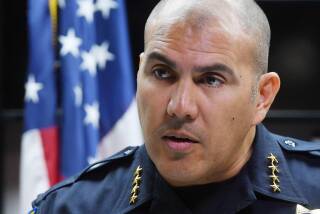Alex Fagan Sr. dies at 60; S.F. police chief’s tenure undermined by ‘Fajitagate’ scandal
Alex Fagan Sr., who went from highly decorated street cop to San Francisco police chief during a 30-year career that ended in a scandal involving his rookie officer son and a bag of fajitas, died Monday after collapsing on a London street. He was 60.
A spokesman for Scotland Yard said Fagan’s death was not suspicious. Autopsy results are expected Wednesday.
The former police chief had moved to London from his Napa home three weeks ago to be with his longtime companion, Shannon Hodges, an Internal Revenue Service agent who was recently transferred to England. He was walking his dog when he was stricken, said Dan Dillon, a friend of 22 years.
Often described as a cop’s cop, Fagan was decorated for valor eight times before he was named police chief in 2003 by then-Mayor Willie Brown.
“He had great instincts as a police officer, great instincts for public safety,” said Victor Makras, who was a San Francisco police commissioner during Fagan’s rise up the ranks. “If you had an incident, you’d want him to respond to your 911 call. He cared. And he knew how to take care of business.”
But Fagan was chief for less than year, his tenure tarnished by a controversy dubbed “Fajitagate” that caused turmoil in the department and undermined his authority.
In November 2002, after a party celebrating Fagan’s promotion to assistant chief, his son, Alex Fagan Jr., and two other rookie officers encountered two strangers outside a San Francisco bar. The officers, who were off duty and out of uniform, demanded a bag of steak fajitas from one of the men. A brawl ensued, resulting in the officers’ arrest on felony assault charges.
A few months later, the senior Fagan and other top police brass, including then-Chief Earl Sanders, were indicted on charges of conspiring to obstruct the investigation of the incident.
Sanders went on medical leave and never returned to his job, even though the obstruction charges against him, Fagan and the other command officers were dropped for lack of evidence. Fagan was named acting chief the day after the charges were dismissed. He was officially named chief when Sanders retired in August 2003.
His son and the other two officers were eventually acquitted.
Fagan’s supporters said he earned the chief’s job because he had improved police accountability procedures. He also won plaudits for the department’s handling of massive demonstrations against the Iraq war in the spring of 2003 that saw little violence despite more than 2,000 arrests.
Born on Nov. 2, 1950, Fagan grew up in the working-class East Bay city of Richmond. He joined the department in 1973 after earning a bachelor’s degree in criminology from UC Berkeley and a master’s degree in criminal justice administration from San Jose State University.
He quickly distinguished himself in the department. In 1976 he was credited with helping to save 30 men from a fire at a gay bathhouse. In 1979 he swam 200 yards to help save a suicidal woman in the bay.
His career also had rocky moments. In 1990 he was arrested in San Mateo County after he allegedly grabbed one California Highway Patrol officer and threatened another who had responded to a report of a roadside argument between Fagan and a female companion. Fagan was never charged in the case, but the department suspended him for 15 days and sent him to an 18-month alcohol treatment program.
In 2000 he struck another car while driving a department vehicle. Apparently intoxicated, he exchanged some information with the other driver, then abandoned his teenage daughter at the scene and departed. He was not charged but served a month without pay.
“I’ve done some things I’m not proud of,” he told The Times in 2003, “but I’ve been punished for what I’ve done, and I’ve never made any excuses. I think those problems have helped me make better decisions today.”
Despite these incidents, Fagan was considered a hardworking and charismatic administrator. He hobnobbed with the city’s elite and was active in the Guardsmen, a nonprofit group that raises money for the city’s disadvantaged youth.
When Mayor Gavin Newsom took office in January 2004, he asked Fagan to step down as chief and become head of the city’s Office of Emergency Services. Fagan’s tenure there ended after only a few months, when details surfaced of his involvement in a drunken brawl with his son in a Scottsdale, Ariz., hotel that resulted in his son’s arrest.
Fagan retired in March 2004 and moved to Napa, where he biked 20 miles a day with a cycling club. “He hadn’t had a drink in six years and was in fantastic shape,” Dillon said. “He had gotten to the point where he wanted to be at peace with himself. He did achieve that.”
In addition to Hodges, Fagan is survived by his daughter, Anne, and his son, who is serving in Afghanistan as a member of the Army Special Forces.
More to Read
Start your day right
Sign up for Essential California for the L.A. Times biggest news, features and recommendations in your inbox six days a week.
You may occasionally receive promotional content from the Los Angeles Times.







